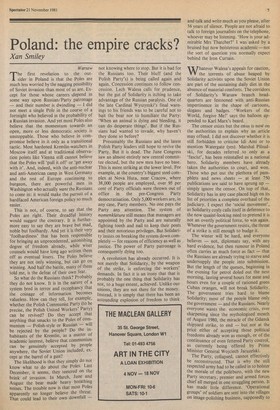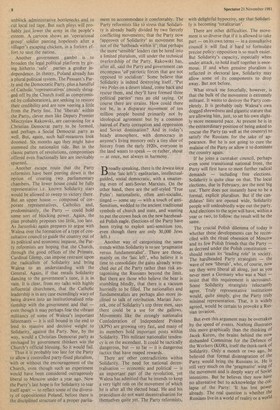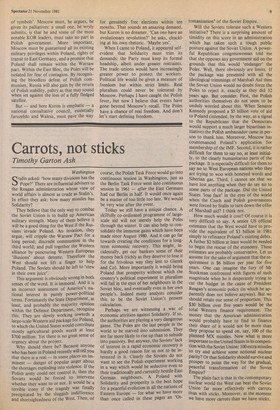Poland: the empire cracks?
Xan Smiley
Warsaw The first revelation to the outsider in Poland is that the Poles are much less worried by the nagging possibility of Soviet invasion than most of us are. Except for those whose careers \depend in some way upon Russian/Party patronage — and their number is dwindling — I did not meet a single Pole in the course of a fortnight who believed in the probability of a Russian invasion. And yet most Poles also believe that the momentum towards an open, more or less democratic society is unstoppable. Those who believe in compromise believe in it only as a transitional tactic. Most hardened Kremlin-watchers in Moscow itself and at traditional observation points like Vienna still cannot believe that the Poles will 'pull it off' or 'get away with it'. And, indeed, with the anti-nuclear and anti-American camp in West Germany and the rest of Europe continuing to burgeon, there are powerful men in Washington who actually want the Russians to come in: it would make the pursuit of a hardfaced American foreign policy so much easier.
This is not, of course, to say that the Poles are right. Their dreadful history would suggest the contrary. It is furthermore easy to say they are brave but mad, noble but foolhardy. And yet it is their very 'foolhardiness' that has been responsible for bringing an unprecedented, astonishing degree of freedom already, while wiser counsels would have long ago written them off as eventual losers. The Poles believe they are not only winning, but can go on winning. And half the battle, many of them told me, is the defeat of their own fear.
So what do the Russians think? Probably they do not know. It is in the nature of a system bred in terror and sycophancy that the coinage of information becomes valueless. How can they tell, for example, whether the Polish Communist Party (to be precise, the Polish United Workers' Party) can be revived? Do they accept that anything that smacks to the Poles of communism — Polish-style or Russian — will be rejected by the people? Do the inhabitants of the Kremlin, as a matter of academic interest, believe that. communism can be genuinely accepted by people anywhere, the Soviet Union included, except at the barrel of a gun? The likelihood is that they simply do not know what to do about the Poles. Last December, it seems, they teetered on the brink of invasion. In March, June and August the bear made heavy breathing noises. The trouble now is that most Poles apparently no longer believe the threat. That could lead to their own downfall — not knowing where to stop. But it is bad for the Russians too. Their bluff (and the Polish Party's) is being called again and again. Concession continues to follow concession. Lech Walesa calls for prudence, but the gut of Solidarity is itching to take advantage of the Russian paralysis. One of the late Cardinal Wyszynski's final warnings to his friends was to be careful not to bait the bear nor to humiliate the Party: 'When an animal is dying and bleeding, it can do desperate things'. But if the Russians had wanted to invade, why haven't they .done so before?
Presumably the Russians and the latest Polish Party leaders still hope to revive the Party. But it is dead. The June Congress saw an almost entirely new central committee elected, but the new men have no base. This is more striking at the lower level. For example, at the country's biggest steel complex at Nova Huta, near Cracow, where 38,000 people are employed, over 95 per cent of Party officials were thrown out of office in the pre-Congress Party democratisation. Only 5,000 workers are, in any case, Party members. No one pays the Party any attention. The system of nomenklatura still means that managers are appointed by the Party and are naturally fighting tooth and nail to keep their posts and their notorious privileges. But Solidarity insists on breaking the system down completely — for reasons of efficiency as well as justice. The power of Party patronage is consequently dying too.
A revolution has already occurred. It is not merely that Solidarity, by the weapon of the strike, is enforcing the workers' demands. In fact it is an irony that that is probably the one thing that Solidarity has not, to a huge extent, achieved. Unlike our unions, they are not there for the money. Instead, it is simply that there has been an astounding explosion of freedom to think and talk and write much as you please, after 36 years of silence. People are not afraid to talk to foreign journalists on the telephone, whoever may be listening. 'How is your admirable Mrs Thatcher?' I was asked by a bruised but now boisterous academic—not the sort of question you normally expect behind the Iron Curtain.
Whatever Walesa's appeals for caution, the torrents of abuse heaped by Solidarity activists upon the Soviet Union are part of the sustaining daily diet in the absence of material comforts. The corridors of Solidarity's Warsaw branch headquarters are festooned with anti-Russian impertinence in the shape of cartoons, slogans and badges. 'Workers of the World, forgive Me!' says the balloon appended to Karl Marx's beard.
The censor exists but the onus is noW on the authorities to explain why an article may offend. I did not discover whether it is still forbidden to criticise Idi Ami or to mention Watergate (yes). Marshal Pilsudski, for decades referred . to only as a 'fascist', has been reinstalled as a national hero. Solidarity members have already taken the authorities to court, and won. Those who put out the plethora of pamphlets and news sheets — at least 750 publications are said to have sprung up — simply ignore the censor. On top of that, Solidarity has in any case placed high on its list of priorities a complete overhaul of the judiciary. I expect the 'social movement', as Solidarity coyly calls itself in deference to the now quaint-looking need to pretend it is not an overtly political force, to win again. Whenever the government resists, the threat of a strike is still enough to budge it.
The winter will be hard, and everyone believes — not, diplomats say, with any hard evidence, but then rumour in Poland often carries as much force as fact — that the Russians are already trying to starve and undersupply the people into submission. But the length of the queues, beginning in the evening for petrol doled out the next morning, lasting several hours for meat and hours even for a couple of rationed green Cuban oranges, will not break Solidarity. The government tries hard to blame Solidarity; most of the people blame only the government — and the Russians. Nearly everyone wants the economic crisis, ever sharpening since the mythologised month of August 1980, the miracle of the Gdansk shipyard strike, to end — but not at the price either of accepting those political freedoms already won as enough, or of the continuance of even fettered Party control, as currently being offered by Prime Minister General Wojciech Jaruzelski.
The Party, collapsed, cannot effectively be reconstructed. That is why the still respected army had to be called in to bolster the morale of the politburo, with the new Party secretary, premier and armed forces chief all merged in one struggling person. It has made little difference. 'Operational groups' of soldiers are sent into the villages on image-polishing business, supposedly to unblock administrative bottlenecks and to cut local red tape. But such ploys will probably just lower the army in the people's esteem. A cartoon shows an `operational group' soldier panting hopelessly after a villager's escaping chicken, in a forlorn effort to save the nation.
Another government gambit is to broaden the legal political platform by giving hitherto `safe' parties a greater independence. In theory, Poland already has a plural political system. The Peasant's Party and the Democratic Party, plus a handful of Catholic `representatives' (mostly shrugged off by the Church itself as compromised by collaboration), are seeking to restore their credibility and are now veering a little from the Party line. The `liberals' within the Party, clever men like Deputy Premier Mieczyslaw Rakowski, are canvassing for a Christian Democrat party to be formed, and perhaps a Social Democrat party as well. But, again, such half-measures look doomed. Six months ago they might have stemmed the nationalist tide. But in the classic pattern of revolutions, compromises offered even fractionally late are inevitably spurned.
Another escape route that the Party reformists have been peering down is the option of creating two parliamentary chambers. The lower house could be fully representative i.e. known Solidarity stars would be allowed to sweep to victory there. But an upper house — composed of corporate representatives, Catholics and, predominantly, the Party — could hold some sort of blocking power. Again, the plan probably proposes too little, too late. As Jaruzelski again prepares to argue with Walesa over the formation of a type of consultative council to guide the country out of its political and economic impasse, the Party reformists are hoping that the Church, through the good offices of the Primate, Cardinal Glemp, can impose restraint upon the radicalism of Solidarity and bring Walesa to an understanding with the General. Again, if that entails Solidarity dancing to the government's tune, it is in vain. It is clear, from my talks with highly influential churchmen, that the Catholic leadership is in any case exceedingly wary of being drawn into an institutionalised relationship with the government and that — even though it may perhaps fear the vibrant militancy of some of Walesa's important lieutenants — it is still bound in the end to lend its massive and decisive weight to Solidarity, against the Party. Nor, by the way, would a Christian Democrat party as envisaged by government thinkers win the Church's official blessing. So it would fail. Thus it is probably too late for the Party to allow a controlled party-fixed pluralism, with or without the encouragement of the Church, even though such an experiment would have been considered outrageously liberal to Moscow under a year ago. Now the Party's last hope is for Solidarity to tear itself apart — to reflect some of the diversi ty of oppositionist Poland, before there is the disciplined structure of a proper parlia ment to accommodate it comfortably. The Party reformists like to stress that Solidarity is already badly divided by two fiercely conflicting movements; that the Party now `approves of Solidarity' as movement but not of the 'hotheads within it'; that perhaps the more `sensible' leaders can be lured into a limited pluralism, still under the technical overlordship of the Party. Rakowski has, after all, said the Party and government can encompass 'all patriotic forces that are not opposed to socialism'. Some believe that Solidarity is indeed destroying itself. `Put two Poles on a desert island, come back and rescue them, and they'll have formed three political parties' runs an old saying. Of course there are strains. How could there not be, in a disparate movement of ten million people bound primarily not by ideological agreement but by a common hatred of Party corruption and oppression and Soviet domination? And in today's heady atmosphere, with democracy in anyone's living memory only a tiny slice of history from the early 1920s, everyone in the land wants to speak — or rather, shout — at once, not always in harmony.
Broadly speaking, there is the lewica laica (the `laic left'): egalitarian, intellectualguided, social democratic, with a smattering even of anti-Soviet Marxists. On the other hand, there are the self-styled `True Poles': nationalistic, often anti-socialist, tinged — some say — with a touch of antiSemitism, wedded to the ancient traditional symbols of church and state, and wanting to put the crown back on the new bareheaded Polish eagle. (Sections of the Party have been trying to exploit anti-semitism too, even though there are only 30,000 Jews left.)
Another way of categorising the same trends within Solidarity is to see `pragmatist versus fundamentalist'. There are those, mainly on the 'laic left', who believe it is time to consolidate the gains already wrenched out .of the Party rather than risk antagonising the Russians beyond the limit. But there are those who believe the bear is stumbling blindly, that there is a vacuum hurriedly to be filled. The nationalists and fundamentalists are perhaps also more inclined to talk of retribution. Marian Jurczek, one of Solidarity's top three men, says there could be a use for the gallows. Movements like the strongly nationalist Confederation of Independent Poland (KPN) are growing very fast, and many of its members hold important posts within Solidarity. This militant nationalist tendency is on the ascendant. It could be tactically dangerous, but — so far — it is dangerous tactics that have reaped rewards.
There are other contradictions within Solidarity. The need for national decentralisation — economic and political — is an important part of the revolution, yet Walesa has admitted that he intends to keep a very tight rein on the movement of which he is after all the elected head. He and his praesidium do not want decentralisation for themselves quite yet. The Party reformists, with delightful hypocrisy, say that Solidarity is becoming `totalitarian'.
There are other difficulties. The movement is so diverse that if it is allowed to take part — on its own terms — in a consultative council it will find it hard to formulate precise policy: opposition is so much easier. But Solidarity's capacity, especially when under attack, to hold itself together is enormous. If and when genuine pluralism is reflected in electoral law, Solidarity may allow some of its components to drop away. But not before.
What struck me forcefully, however, is that the bulk of the movement is extremely militant. It wants to destroy the Party completely. It is probably only Walesa's own dogged shrewdness and gigantic stature that are allowing him, just, to set his own slightly more measured pace. At present he is in the extraordinary position of being asked to rescue the Party (as well as the country) to satisfy the Russians for the sake of appearance. But he is not going to cure the malaise of the Party or allow it to dominate the country again.
If he joins a caretaker council, perhaps even some transitional national front, the Party will first have to meet further radical demands — including free elections. Solidarity is quite clear on that. The local elections, due in February, are the next big test. There does not instantly have to be a formal, explicit pluralism. But if the candidates' lists are opened wide, Solidarity people will undoubtedly wipe out the party. And elections to the sejm will have, within a year or two, to follow: the result will be the same.
The crucial Polish dilemma of today is whether these developments can be reconciled with the ritual obsession of Moscow and its few Polish friends that the Party — as decreed under the Polish constitution — should retain its `leading role' in society. The hardheaded Party strategists — the wave of new liberals', who, of course, now say they were liberal all along, just as you never meet a Germany who was a Nazi — insist that this requirement is sacrosanct. Some Solidarity strategists reluctantly agree. Truly representative institutions would, quite simply, give the Party truly minimal representation. That, it is widely agreed, would be certain to provoke a Russian invasion.
But even this argument may be overtaken by the speed of events. Nothing illustrates this more graphically than the thinking of Jacek Kuron, the brains behind the now disbanded Committee for the Defence of the Workers (KOR), itself the think-tank of Solidarity. Only a month or two ago, he believed that formal disintegration of the Party would bring the Russians in. He is still very much on the `pragmatist' wing of the movement and is deeply wary of Soviet intentions. But he believes they now have no alternative but to acknowledge the collapse of the Party: 'It has lost power already. The real question is whether the Russians live in a world of reality or a world of symbols'. Moscow must, he argues, be given its palliatives: a small one, he wryly submits, is that he and some of the most notable KOR leaders, must take no part in Polish government. More important, Moscow must be guaranteed all its existing military privileges within Poland, rights of transit to East Germany, and a promise that Poland shall remain within the Warsaw pact. Within the East Bloc, the Poles will be isolated for fear of contagion. By recognising the bloodless defeat of Polish communism, Russia will also gain by the return of Polish stability, paltry as that may sound when set against the loss of a fully fledged satellite.
But — and here Kuron is emphatic — a national consultative council, essentially Jaruzelski and Walesa, must pave the way for genuinely free elections within ten months. That sounds an amazing demand, but Kuron is no dreamer. 'Can one have an evolutionary revolution?' he asks, chuckling at his own rhetoric. 'Maybe yes'.
When I came to Poland, it appeared selfevident that Solidarity must trim its demands: the Party must keep its formal headship, albeit under greater restraints. The trade unions would have increasingly greater power to protect the workers. Political life would be given a measure of freedom but within strict limits. Real pluralism could never be tolerated by Moscow. Perhaps I have caught the Polish fever, but now I believe that events have gone beyond Moscow's recall. The Poles have a chance of real freedom. And don't let's start defining freedom.












































 Previous page
Previous page